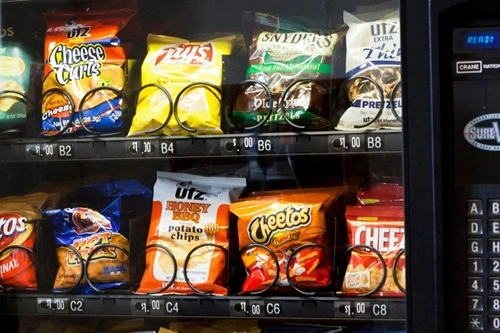Junk food has long been a staple in school vending machines across the United States. From sugary sodas and candy bars to processed chips and cookies, these unhealthy snacks are easily accessible to students throughout the school day. However, with rising concerns over childhood obesity, poor nutrition, and declining academic performance, schools are under increasing pressure to prioritize student health.
Banning junk food from school vending machines is not just about cutting out unhealthy snacks—it’s about fostering a healthier learning environment, reducing health risks, and promoting better eating habits among students. With new studies linking junk food consumption to serious long-term health issues, many experts argue that it’s time for schools to take decisive action.
The Case for Banning Junk Food in Schools

1. Rising Childhood Obesity Rates
One of the biggest concerns surrounding junk food in schools is its direct contribution to childhood obesity. According to the Centers for Disease Control and Prevention (CDC), nearly 20% of children and adolescents in the U.S. are classified as obese, a number that has tripled since the 1970s.
- Easy access to junk food leads to overconsumption of empty calories.
- High sugar and fat intake from vending machine snacks contribute to weight gain.
- Lack of nutritional value prevents students from making healthier food choices.
A 2023 study by the Harvard T.H. Chan School of Public Health found that students who regularly consume junk food from vending machines are more likely to develop obesity-related health issues, including diabetes and heart disease.
2. Negative Impact on Academic Performance
Nutrition plays a crucial role in brain function, concentration, and learning. Junk food, which is high in sugar and unhealthy fats, causes energy crashes and affects students’ ability to focus in class.
A 2024 report by the National Institutes of Health (NIH) found that students who consume healthier meals perform better on standardized tests and have improved attention spans. The study also revealed that poor nutrition leads to:
- Shorter attention spans and difficulty focusing
- Increased behavioral issues and hyperactivity
- Higher rates of absenteeism due to diet-related illnesses
Replacing vending machine junk food with healthier options, such as fruits, yogurt, and whole-grain snacks, can improve students’ ability to concentrate and retain information.
3. Long-Term Health Risks
Beyond obesity, regular consumption of junk food leads to severe long-term health complications. The American Heart Association (AHA) warns that excessive sugar and processed food intake increases the risk of:
- Type 2 diabetes
- High blood pressure
- Heart disease and stroke
- Weakened immune systems
By banning junk food from school vending machines, schools can help prevent students from developing these health conditions later in life.
4. Promoting Better Eating Habits
Schools play a crucial role in shaping lifelong eating habits. If students are constantly surrounded by vending machines filled with chips, candy, and sodas, they are more likely to develop poor eating habits that continue into adulthood.
A 2023 study published in the Journal of School Health found that schools that removed junk food from vending machines saw a 40% decrease in students consuming unhealthy snacks and a 25% increase in students choosing healthier options.
Encouraging healthier choices in schools can help students:
- Develop a preference for nutritious foods.
- Understand the importance of a balanced diet.
- Carry these habits into adulthood, reducing future health risks.
5. Reducing Peer Pressure and Unhealthy Competition
Students are heavily influenced by their peers. If junk food is available, many students will buy it simply because their friends do. This peer-driven demand for unhealthy snacks creates a culture where unhealthy eating is normalized.
Banning junk food levels the playing field, ensuring that all students have access to healthier snacks rather than being pressured into making poor dietary choices.
6. Schools Have a Responsibility to Protect Student Health
Public schools are responsible for the well-being of students during school hours. If schools provide junk food, they are indirectly endorsing unhealthy eating habits. Many schools have already taken steps to remove soda machines, and expanding these efforts to include all junk food is the next logical step.
Counterarguments and Responses
1. Won’t Banning Junk Food Reduce School Revenue?
Many schools rely on vending machine revenue to fund extracurricular programs. However, research shows that replacing junk food with healthier options does not significantly impact profits.
A 2024 study by the USDA found that schools that switched to healthier vending machine options maintained nearly the same revenue levels. In some cases, sales even increased because parents were more willing to give their children money for healthier snacks.
2. Shouldn’t Students Have the Freedom to Choose?
While personal choice is important, schools must balance choice with responsibility. Just as schools do not allow smoking or alcohol on campus, they should also restrict foods that harm student health.
Students can still buy junk food outside of school, but schools should not actively contribute to unhealthy eating habits.
3. Won’t Students Just Bring Junk Food from Home?
Some students may bring junk food from home, but limiting school access to unhealthy snacks significantly reduces overall consumption. Schools should also implement nutrition education programs to teach students about healthy eating.
4. What About Students Who Need Quick and Convenient Food Options?
Healthy snacks can be just as convenient as junk food. Schools can stock vending machines with:
- Nuts and trail mix
- Granola bars
- Dried and fresh fruit
- Low-fat yogurt
- Whole-grain crackers
These options provide quick energy without the harmful effects of junk food.
FAQs on Junk Food Bans in Schools
1. Have other schools successfully banned junk food?
Yes. Many schools across the U.S. have removed junk food from vending machines and seen improvements in student health and behavior. California, for example, has strict laws regulating what can be sold in school vending machines.
2. Will banning junk food completely stop students from eating it?
No, but it will significantly reduce their consumption during school hours, which is a major step toward healthier habits.
3. Are there any laws supporting the removal of junk food from schools?
Yes. The Healthy, Hunger-Free Kids Act (2010) established guidelines for healthier school meals, and many states have implemented policies to limit junk food sales in schools.
4. What should parents do if they disagree with a junk food ban?
Parents should focus on educating their children about healthy eating at home and support school policies that promote student well-being.
Conclusion
Banning junk food from school vending machines is a necessary step toward protecting students’ health, improving academic performance, and encouraging lifelong healthy habits. Schools have a responsibility to provide nutritious options that support student well-being rather than contribute to obesity and chronic diseases.
With strong evidence linking junk food to negative health outcomes, it is time for all schools to make the switch to healthier vending machine options. The long-term benefits far outweigh any short-term concerns, ensuring a healthier future for students across the country.



